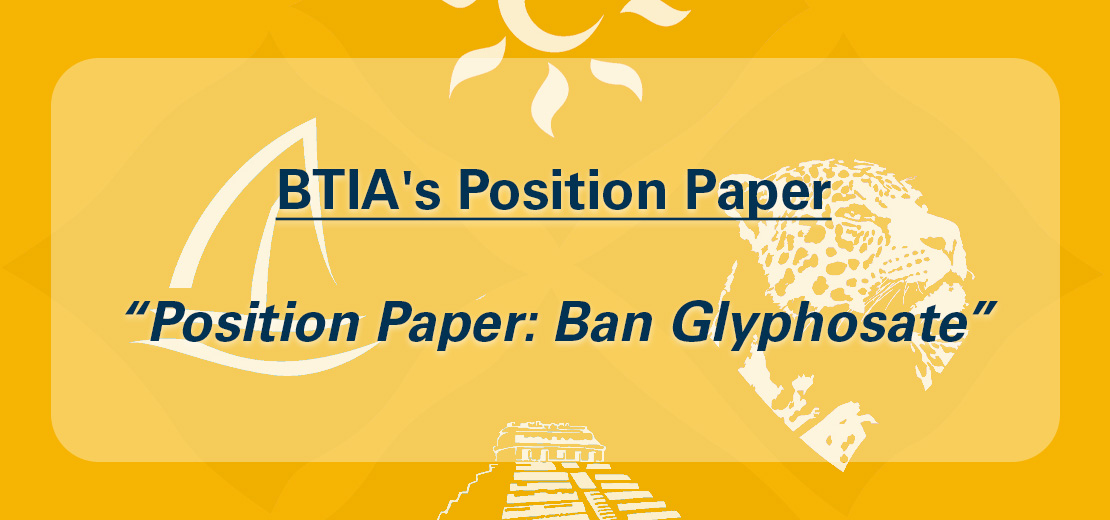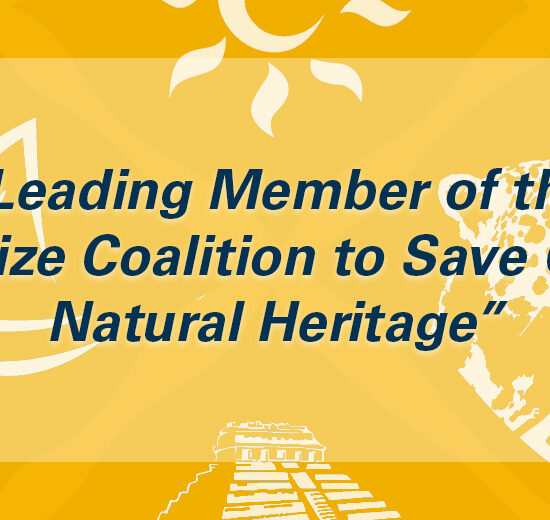
Position Paper: Ban Glyphosate
The chemical compound Glyphosate (the key ingredient in Roundup) is the number one pesticide used to eradicate weeds in farms in Belize and worldwide. The World Health Organization’s IARC (International Agency for Research on Cancer) classified glyphosate as a probable carcinogen in 2015. The Pesticide Action Network International (PAN) issued a comprehensive report in 2016 stating several long term and chronic effects on the environment, humans and animals worldwide due to the high usage of glyphosate.
The alarming conclusions from international studies and reports about the effects and impacts of glyphosate have been taken into consideration by the Belize Tourism Industry Association (BTIA) as a national issue that needs to be given urgent attention.
The Pesticide Control Board, as the entity that oversees and approves the importation of chemicals that support farming practices within the agriculture sector in Belize, should review and consider alternatives to replace glyphosate and the possibility to ban the usage of the harmful substance in Belize.
CONCERNS
- Studies have shown that long-term toxicity of glyphosate on humans may cause chronic health, neurological and immune issues, digestive issues and development effects such cancer,infertility, pregnancy problems, birth defects, autism, Alzheimer’s disease, Parkinson’s disease, liver diseases and respiratory diseases.
- Several epidemiological studies have linked exposure to glyphosate with non-Hodgkin’s lymphoma, hairy cell leukaemia, multiple myeloma, and DNA damage.
- Studies have also shown that even low concentrations of glyphosate can damage the liver, kidneys, skin cells and causes ageing and potentially cancer. The residues of glyphosate have been found in human’s breast milk, blood and urine.
- One of the most alarming facts is that glyphosate residues have been found in vaccines.
- With regards to the environment, glyphosate has equally devastating effects upon the environment, e.g., aquatic effects, soil and plant health, earthworms and beneficial insects, birds and other animals, including livestock and domestic animals.
- In plant seeds, glyphosate decreases levels of calcium, magnesium, iron and manganese, “leading to deficiencies in these nutrients in humans who consume foods derived from glyphosate-exposed crops.” Glyphosate is mainly use for the farming of sugar, corn, wheat and soy.
- Glyphosate exposure is the most likely reason for the epidemic in a new type of kidney disease among young agricultural workers in sugar cane fields in El Salvador and elsewhere in Central America. Furthermore, due to its high use by farmers in Belize, glyphosate contaminates our water sources and supplies. Studies show life-long exposure to glyphosate in animals’ causes liver and kidney dysfunction, greatly increased risk of cancer and shortened lifespan.
- The alarming die-off of honeybees is linked to record levels of glyphosate use. The animal population needs to be protected; they form a very important role in our ecosystems and way of life.
- The wide usage of glyphosate and complete disregard of the negative impacts on the environment, people and wildlife is a matter that has to be recognized and given an adequate level of importance and attention.
- The presence of glyphosate in the environment, in our waters, and in our food supply cannot be ignored; statistical data in Belize since 1990 demonstrates an increase of the chronic illnesses associated with glyphosate usage in Belize.
- Glyphosate can be considered the most significant environmental toxin, mainly because it is pervasive and it is often handled carelessly due to its perceived nontoxicity. Its manufacturer, Monsanto, continues to disregard the negative impacts it creates on the environment, animals and people.
RECOMMENDATIONS
- The Pesticide Control Board should conduct its own in-house analysis of the international reports about the long-term negative impacts of glyphosate in Belize and worldwide.
- Ultimately, the Pesticide Control Board should be considering the complete ban of glyphosate use in Belize. Alternative products and farming practices should begin to be considered.
- An awareness and education campaign about the negative impacts of glyphosate should be developed and implemented with local farmers and the public at large in Belize. This will allow for everyone to be aware of the problem and about the possible solutions.
- Belize must become a leader in addressing these global problems that have a direct impact on the welfare of its people and the environment. Several countries have already established a ban on glyphosate; Belize should follow suit.
The BTIA aims to bring these facts to the attention of the Government and people of Belize for solutions to this problem to be considered. The welfare of the population and the environment of Belize are of optimum priority to the BTIA. Belize needs to become a leader in sustainable development and the protection and good stewardship of our environment and ecosystems.
Submitted: 12 June 2017
Submitted by:
Belize Tourism Industry Association
#10 North Park Street
P.O. Box 62
Belize City, Belize
Office #: (501) 227-1144
Email: [email protected]



